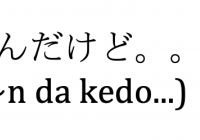Tips for asking other for help with a foreign language
When studying a foreign language, it’s natural for all sorts of questions to come up––how to pronounce words, how to use grammar correctly, and (perhaps the hardest) how to speak or write natural sounding language. For those taking a formal language class, generally there will be some time either after or during class to ask… Read More »







